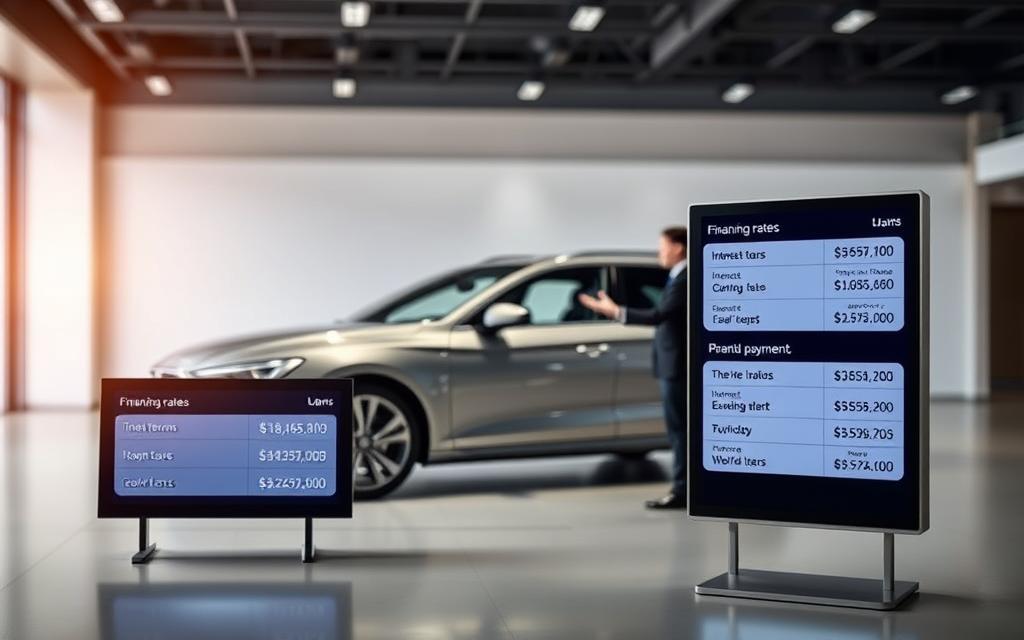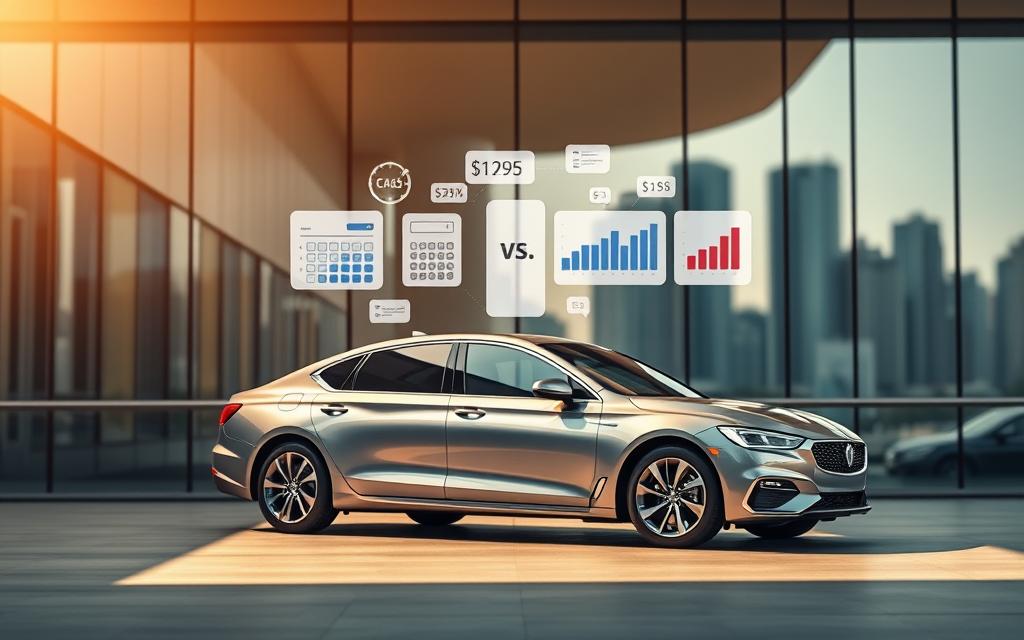When you’re in the market for a new vehicle, understanding the factors that influence car financing rates is crucial. One key determinant is your credit score, which plays a significant role in the types of loans and terms you’ll be offered.
Knowing your credit score beforehand can help you navigate the car financing process more effectively. A good credit score can lead to more favorable loan terms, including lower interest rates, while a poor credit score may result in less desirable terms or even loan rejection.
Understanding the impact of your credit score on car financing rates can help you make informed decisions when applying for a car loan.
Understanding Credit Scores and Their Importance
Understanding your credit score is essential for navigating the car financing process effectively. Your credit score is a three-digit number that represents your creditworthiness, and it plays a significant role in determining the interest rate you’ll qualify for when financing a car.
A good credit score can save you thousands of dollars in interest, making it vital to understand how it’s calculated and what it means for your car financing options.
What Makes Up Your Credit Score
Your credit score is calculated based on several factors, including your payment history, credit utilization, length of credit history, new credit inquiries, and credit mix. Payment history accounts for the largest portion, typically 35%, as it reflects your ability to make timely payments.
Credit utilization, which is the ratio of your outstanding balances to your available credit, is another critical factor. Keeping this ratio low can positively impact your credit score.
The FICO Score Range Explained
The FICO score range is typically categorized into several tiers, including low to fair (300-649), good (650-725), very good (725-760), and excellent (760-900). Understanding where you fall within this range can help you anticipate the car financing rates you might qualify for.
For instance, individuals with excellent credit scores are often offered prime rates and more favorable loan terms, while those with lower scores might face higher interest rates and stricter requirements.
The Direct Relationship Between Credit Scores and Car Loan Interest Rates
Credit scores play a pivotal role in determining the interest rates offered on car loans. A good credit score can significantly lower your car loan interest rate, resulting in substantial savings over the life of the loan.
According to Experian data, the average interest rate for a new car loan was 6.73% in Q1 2025, with an average monthly payment of $745. However, borrowers with excellent credit scores can secure much lower interest rates, such as 5.18% for new cars. This difference highlights the importance of maintaining a good credit score when applying for car financing.
Average Auto Loan Rates by Credit Score Tier
The interest rates offered on car loans vary significantly based on the borrower’s credit score tier. For instance, individuals with excellent credit scores (800-850) can expect to receive lower interest rates compared to those with poor credit scores (580-669).
| Credit Score Tier | Average Interest Rate |
|---|---|
| Excellent (800-850) | 5.18% |
| Good (740-799) | 5.5% |
| Fair (670-739) | 6.2% |
| Poor (580-669) | 8.5% |
How Much Money a Good Score Can Save You
Having a good credit score can save you a significant amount of money over the life of your car loan. For example, on a $30,000 car loan over 60 months, a borrower with an excellent credit score might receive a 5.18% interest rate, resulting in total interest paid of approximately $4,100. In contrast, a borrower with a poor credit score facing an 8.5% interest rate would pay around $7,400 in total interest.
This difference of $3,300 in interest payments underscores the financial benefits of maintaining a good credit score. By understanding the direct relationship between credit scores and car loan interest rates, borrowers can take proactive steps to improve their credit standing and secure more favorable loan terms.
Credit Score Tiers and What They Mean for Car Financing
Different credit score tiers directly impact car financing rates, with higher scores typically leading to more favorable loan conditions. Lenders use credit scores to determine the risk associated with lending to a borrower, and this risk assessment directly influences the interest rate and terms offered.
Excellent Credit (800-850): Prime Rates and Special Offers
Individuals with excellent credit scores are considered low-risk borrowers. They are often offered prime interest rates and may qualify for special promotions, such as cashback offers or lower fees.
For example, a borrower with an excellent credit score might secure a car loan at an interest rate of around 3.5%, significantly reducing their overall cost.
Good Credit (740-799): Competitive Rates and Terms
Borrowers in this tier are still considered to have a good credit standing, though not as strong as those with excellent credit. They can expect to receive competitive interest rates and reasonable loan terms.
A good credit score can result in an interest rate between 4% to 5%, which is slightly higher than prime rates but still favorable.
Fair Credit (670-739): Moderate Rates with Some Limitations
Those with fair credit scores are viewed as having a moderate risk profile. While they can still secure car financing, the interest rates may be higher, and the terms might include stricter repayment conditions.
Interest rates for fair credit scores typically range from 6% to 8%, reflecting the increased risk perceived by lenders.
Poor Credit (580-669): Higher Rates and Stricter Requirements
Borrowers with poor credit scores face significant challenges, including higher interest rates and stricter loan requirements. They might need to provide additional collateral or make a larger down payment.
Interest rates can be substantially higher, often between 10% to 15% or more, making the overall cost of the loan much higher.
| Credit Score Tier | Interest Rate Range | Loan Terms |
|---|---|---|
| Excellent (800-850) | 3% – 4% | Prime rates, special offers |
| Good (740-799) | 4% – 5% | Competitive rates, reasonable terms |
| Fair (670-739) | 6% – 8% | Moderate rates, some limitations |
| Poor (580-669) | 10% – 15% | Higher rates, stricter requirements |
How Your Credit Score Affects Car Financing Rates in Different Lending Environments
Your credit score plays a pivotal role in determining car financing rates across various lending institutions. Understanding this connection is key to securing the best possible deal on your car loan.
Bank Loans vs. Credit Union Financing
When considering car financing, two primary options are bank loans and credit union financing. Banks typically offer a wide range of loan products, but their interest rates can be less competitive for those with lower credit scores. Credit unions, on the other hand, are member-owned cooperatives that often provide more favorable terms, including lower interest rates for their members, making them an attractive option for those with good credit.
A comparison of the two reveals that credit unions may offer more personalized service and more flexible lending criteria, potentially benefiting borrowers with less-than-perfect credit.
| Lender Type | Interest Rates for Good Credit | Interest Rates for Poor Credit |
|---|---|---|
| Banks | 4.5% – 6.5% | 10% – 15% |
| Credit Unions | 4% – 6% | 8% – 12% |
Dealership Financing vs. Third-Party Lenders
Dealership financing and third-party lenders represent another dichotomy in car financing. Dealerships often have relationships with multiple lenders, allowing them to shop around for rates on your behalf. However, this convenience can come at a cost, as the dealer may mark up the interest rate to make a profit. Third-party lenders, including online lenders and specialty auto finance companies, can offer competitive rates and terms, but may have varying levels of customer service.
It’s essential to compare offers from both dealership financing and third-party lenders to ensure you’re getting the best deal.
Beyond the Score: Other Factors That Influence Your Car Loan Rate
Beyond your credit score, several key factors can significantly impact the rate you receive on your car loan. Lenders consider a combination of elements to assess your creditworthiness and determine the interest rate for your loan.
Debt-to-Income Ratio
Your debt-to-income (DTI) ratio is a crucial factor in determining your car loan rate. It’s calculated by dividing your total monthly debt payments by your gross income. A lower DTI ratio indicates a more manageable debt burden, making you a less risky borrower. Lenders typically prefer a DTI ratio of 36% or less.
| DTI Ratio | Lender Perception | Potential Interest Rate |
|---|---|---|
| 0-36% | Low risk | Competitive rates |
| 37-43% | Moderate risk | Slightly higher rates |
| 44%+ | High risk | Significantly higher rates or loan denial |
Employment History and Income Stability
Lenders also consider your employment history and income stability when evaluating your car loan application. A stable job with a consistent income can lead to more favorable loan terms. Typically, lenders prefer borrowers with at least two years of employment history.
Key factors lenders consider include:
- Length of employment
- Job stability
- Income level
Down Payment Amount
The amount you put down on your car purchase can also impact your loan rate. A larger down payment reduces the loan-to-value (LTV) ratio, making your loan less risky for the lender. This can result in a lower interest rate and more favorable loan terms.
By understanding these additional factors that influence car loan rates, you can better prepare yourself for the car buying process and potentially secure a more favorable interest rate.
Subprime Auto Loans: Understanding High-Interest Financing
When it comes to car financing, individuals with poor credit scores often find themselves facing subprime auto loans with exorbitant interest rates. These loans are designed for borrowers who don’t qualify for prime rates due to their credit history. Understanding the implications of such loans is crucial for making informed decisions.
Subprime auto loans can be costly, and borrowers should be aware of the potential financial burdens they may impose. The high interest rates associated with these loans can significantly increase the total cost of the vehicle.
The True Cost of Bad Credit Auto Loans
The true cost of subprime auto loans extends beyond the monthly payments. Borrowers should consider the total amount paid over the life of the loan, including interest and fees. For instance, a loan with a high interest rate can add thousands of dollars to the overall cost.
It’s essential to calculate the total cost and compare it with other financing options to ensure you’re getting the best deal possible. Borrowers should also be aware of the importance of credit score for car loan rates, as improving their credit score can lead to better financing terms in the future.
Predatory Lending Practices to Watch For
Predatory lending practices are a significant concern in the subprime auto loan market. Borrowers should be cautious of lenders who engage in deceptive practices, such as hidden fees or inflated interest rates. It’s crucial to carefully review the loan terms and conditions before signing any agreement.
To avoid predatory lenders, borrowers should research and compare rates from multiple lenders, ensuring they understand all the terms involved. Being informed about car financing and credit scores can help borrowers navigate the market more effectively and avoid exploitative practices.
Strategies to Improve Your Credit Score Before Car Shopping
Enhancing your credit score prior to car shopping is a savvy move that can lead to more affordable financing options. A good credit score can significantly lower the interest rates you’re offered, potentially saving you thousands over the life of the loan.
Quick Credit Fixes (30-90 Days)
If you’re planning to buy a car soon, there are several quick strategies you can employ to improve your credit score in a short span of 30 to 90 days. Paying off outstanding debt is one of the most effective ways to boost your score. Focus on reducing high-interest debt first, such as credit card balances.
Another strategy is to ensure you’re making all your payments on time. Setting up payment reminders or automating your payments can help you stay on track. It’s also beneficial to avoid applying for new credit during this period, as new inquiries can temporarily lower your score.
| Quick Fix | Impact on Credit Score | Timeframe |
|---|---|---|
| Paying off outstanding debt | Significant improvement | 30-60 days |
| Making timely payments | Moderate improvement | Ongoing |
| Avoiding new credit inquiries | Minimal to moderate improvement | Immediate |
Long-Term Credit Building Strategies
For those with more time before they plan to purchase a vehicle, there are several long-term strategies that can help build a stronger credit profile. Maintaining a long credit history is crucial; this means keeping old accounts open to demonstrate a long history of credit responsibility.
Diversifying your credit is another effective long-term strategy. Having a mix of different credit types, such as credit cards, installment loans, and a mortgage, can positively impact your score. Regularly reviewing your credit report for errors and disputing any inaccuracies is also important.
By implementing these strategies, you can improve your credit score, leading to better car financing rates. Whether you’re looking for quick fixes or long-term improvements, taking control of your credit score can save you money and provide more financing options when you’re ready to buy your next car.
Navigating Car Financing with Less-Than-Perfect Credit
Navigating the car financing process with a less-than-perfect credit score requires careful planning and the right strategies. Borrowers in this situation can consider several options to improve their chances of securing a favorable car loan.
Securing a Co-Signer
One effective way to mitigate the risk associated with less-than-perfect credit is to secure a co-signer. A co-signer with a good credit score can help you qualify for better loan terms, including lower interest rates. This is because the lender has an additional layer of security, knowing that there are two individuals responsible for the loan repayment.
Leveraging a Larger Down Payment
Making a larger down payment is another strategy that can help. By putting more money down upfront, you reduce the amount you need to finance, which can make your loan application more attractive to lenders. This can lead to more favorable terms, including lower interest rates.
| Down Payment Amount | Loan Amount | Interest Rate |
|---|---|---|
| 10% | $20,000 | 6.5% |
| 20% | $18,000 | 5.5% |
| 30% | $16,000 | 4.5% |
Refinancing Options as Your Credit Improves
Even if you secure a car loan with less-than-perfect credit, you may have the opportunity to refinance your loan in the future when your credit score improves. Refinancing can help you secure a lower interest rate, reducing your monthly payments and the overall cost of the loan.
By understanding these strategies and planning accordingly, individuals with less-than-perfect credit can still navigate the car financing process effectively and secure a loan that meets their needs.
Conclusion: Taking Control of Your Credit for Better Car Financing
Understanding how your credit score affects car financing rates is crucial for making informed decisions when shopping for a car loan. By grasping the direct relationship between credit scores and car loan interest rates, borrowers can take control of their credit and potentially save thousands of dollars.
A good credit score can lead to prime rates and special offers, while a poor credit score may result in higher rates and stricter requirements. By maintaining a healthy credit score, individuals can secure better car financing options, ultimately driving down the total cost of their vehicle.
By implementing strategies to improve your credit score, such as quick credit fixes or long-term credit building, you can position yourself for more favorable car loan terms. Taking control of your credit is the first step towards achieving your automotive goals.


